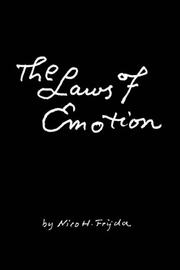| Listing 1 - 10 of 759 | << page >> |
Sort by
|
Book
ISBN: 0803946147 9780803946149 Year: 1992 Volume: 13 Publisher: Newbury Park Sage
Abstract | Keywords | Export | Availability | Bookmark
Book
ISBN: 3031631994 Year: 2024 Publisher: Cham : Springer Nature Switzerland : Imprint: Palgrave Macmillan,
Abstract | Keywords | Export | Availability | Bookmark
 Loading...
Loading...Choose an application
- Reference Manager
- EndNote
- RefWorks (Direct export to RefWorks)
This book puts forward a layered theory of emotions, which argues that emotional processes are best understood as occurrences that happen within complex emotional situational scenarios that integrate different and interconnected layers. According to this theory, there is an underlying logic of emotions which is more akin to a creative endeavor than to a fixed and mechanical structure. The book is divided in three parts. The first part provides the Deweyan historical background and shows how it gives rise to the hypothetical suggestion of the Layered Theory of Emotions. After laying down the Layered Theory of Emotions, the following chapters show how Dewey’s philosophical work grounds the theoretical suggestion. The second part of the book presents various insights that spring from the proposed theory. Among other things, it will show the importance of some new distinctions, such as meta-emotions and emotional depth, and provide a different understanding of previous emotional categories, such emotional intentionality and emotional habits. Finally, the third part of the book concludes by drawing some consequences of the layered theory of emotions for philosophy of mind, and for the general philosophical task. The book hopes to raise thought provoking questions and point out possible future research directions to deepen Dewey’s insightful scholarship, and Emotion Theory. Dina Mendonca is research fellow at Instituto de Filosofia da Nova in Lisbon, Portugal. She received her Ph.D. from the University of South Carolina, and has published widely on American pragmatism and Philosophy for Children. Her teaching also focuses on the role of writing for thinking, and how philosophy can be an aid for creative processes.
Philosophy, American. --- Emotions (Philosophy). --- Pragmatism. --- American Philosophy. --- Philosophy of feelings.
Book
Abstract | Keywords | Export | Availability | Bookmark
 Loading...
Loading...Choose an application
- Reference Manager
- EndNote
- RefWorks (Direct export to RefWorks)
Up to date the scientific discussion about how frequency and regularity of physical activity can be increased is dominated by social-cognitive models. However, increasing evidence suggests that emotions and feelings have greater influence on physical activity than originally assumed (Rhodes, Fiala, & Conner, 2009). Generally speaking, humans possess an evaluative system with a basic action tendency to approach pleasurable events and to avoid aversive ones (Cacioppo & Berntson, 1999). Evaluative responses to a behavior and associated emotional states may influence a decision regarding whether or not to repeat being physically active. Generally, behavior associated with positive evaluations has a higher probability of being repeated than behaviors without such an association. On the contrary, an association with negative evaluations tends to decrease the probability of repeating to be physically active. Hence, evaluative responses to physical activity or the related situation can be an important aspect in the process of physical activity maintenance (McAuley et al., 2007). Several social-cognitive models of behavior change and maintenance were recently extended to take the influence of affective responses into account, in a way that variables already included in the models (e.g. outcome expectancies or attitudes) were more clearly articulated into their cognitive and affective components. For example, with regard to Social Cognitive Theory, Gellert, Ziegelmann and Schwarzer (2012) proposed to distinguish between affective and health-related outcome expectancies, and in the Theory of Planned Behavior, researchers suggested to differentiate between cognitive and affective attitudes (Lawton, Conner, & McEachan, 2009). The results of these and other studies suggest that affective components make a unique contribution to the explanation of the physical activity behavior (Brand, 2006). Other examples come from social cognition research, where it was shown that automatic evaluative responses are part of our everyday life and that they decisively influence health behavior (Hofmann, Friese, & Wiers, 2008). Accordingly, there is evidence that people who exercise regulary hold more positive automatic evaluations with exercise than non-exercisers (Bluemke, Brand, Schweizer, & Kahlert, 2010). Although significant progress has been made in showing that evaluative responses to physical activity and associated emotional states are important predictors of physical activity underlying psychological processes are far from being fully understood. Some important issues still remain to be resolved. Which role play affective states compared to concrete emotions when influencing physical activity? How do affective states and emotions interact with cognitive variables such as intentions? Are evaluative processes before, during or after physical activity important to predict future physical activity? Do negative and positive evaluations interact antagonistically or rather synergistically when physical activity as a new behavior shall be adopted? Future research will help us to resolve these and a lot of other so far unresolved issues.
implicit --- enjoyment --- automatic evaluation --- emotions --- regulation --- mood --- affect --- exercise --- feelings --- physical activity --- implicit --- enjoyment --- automatic evaluation --- emotions --- regulation --- mood --- affect --- exercise --- feelings --- physical activity
Book
Abstract | Keywords | Export | Availability | Bookmark
 Loading...
Loading...Choose an application
- Reference Manager
- EndNote
- RefWorks (Direct export to RefWorks)
Influential theories have argued that affective processing is fundamentally different from cognitive processing. Others have suggested that theoretical boundaries between affective and cognitive processing are artificial and inherently problematic. Over recent years, different positions on these issues have fueled many empirical studies investigating the mechanisms underlying cognitive and affective processing. Where and on what basis should we draw the line between cognition and emotion? Are there fundamental distinctions to be made between the way emotion influences cognition and cognition influences emotion? How does the reciprocal interaction between emotion and cognition lead to adaptive behavior? This Research Topic explores the nature of the reciprocal interaction between emotion and cognition from a functional perspective.
Affect (Psychology) --- Emotions. --- Decision Making --- action --- Cognition --- Emotion Expression --- Affect --- feelings --- goal-directed behavior --- Decision Making --- action --- Cognition --- Emotion Expression --- Affect --- feelings --- goal-directed behavior
Book
ISBN: 2738100341 9782738100344 Year: 1988 Publisher: Paris : Odile Jacob,
Abstract | Keywords | Export | Availability | Bookmark
 Loading...
Loading...Choose an application
- Reference Manager
- EndNote
- RefWorks (Direct export to RefWorks)
Emotions --- Feelings --- Human emotions --- Passions --- Psychology --- Affect (Psychology) --- Affective neuroscience --- Apathy --- Pathognomy
Book
ISBN: 8433905325 Year: 1996 Volume: 182 Publisher: Barcelona Editorial Anagrama
Abstract | Keywords | Export | Availability | Bookmark
 Loading...
Loading...Choose an application
- Reference Manager
- EndNote
- RefWorks (Direct export to RefWorks)
Emotions --- Emotions (Philosophy) --- Philosophy --- Feelings --- Human emotions --- Passions --- Psychology --- Affect (Psychology) --- Affective neuroscience --- Apathy --- Pathognomy
Book
ISBN: 9023216997 9789023216995 Year: 1979 Volume: 5 Publisher: Assen Van Gorcum
Abstract | Keywords | Export | Availability | Bookmark
 Loading...
Loading...Choose an application
- Reference Manager
- EndNote
- RefWorks (Direct export to RefWorks)
Emotions --- Feelings --- Human emotions --- Passions --- Psychology --- Affect (Psychology) --- Affective neuroscience --- Apathy --- Pathognomy

ISBN: 0805825983 0805825975 Year: 2007 Publisher: Mahwah Erlbaum
Abstract | Keywords | Export | Availability | Bookmark
 Loading...
Loading...Choose an application
- Reference Manager
- EndNote
- RefWorks (Direct export to RefWorks)
'The' 'Laws of Emotion' is an accessible new book that reviews much of the insightful new research on emotions conducted over the last ten years. It expands on the theory of emotions introduced in Nico Frijda's earlier work and addresses a number of unanswered, basic problems on emotion theory. The author's goal is to better understand the underlying psychological mechanisms of emotion. In this new book, Professor Frijda also examines previously neglected topics of emotion such as determinants of emotional intensity, the duration of emotions, and sexual emotions. It touches on both evolutionary and neuroscientific explanations. The book begins by reviewing a number of principles governing emotion, or & the laws of emotion& . The author then examines the passionate nature of emotions and the motivational processes underlying them, and the nature and causes of pleasure and pain. Professor Frijda then explores the processes that lead to emotional arousal, including cognitive influences and why people care more about certain things than others. Emotional intensity is then discussed, including the often-neglected topic of the course of emotions over time. The book concludes with the author's insights into complex emotional domains such as sex, revenge, and the need to commemorate past events. ' The' 'Laws of Emotion' will appeal to social, cognitive, and developmental psychologists, social scientists, philosophers, and neuroscientists, as well as anyone interested in the workings of the mind. It also serves as a text for advanced courses in the psychology of emotions or the neuroscience of emotions.
Emotions --- Emotions. --- Feelings --- Human emotions --- Passions --- Psychology --- Affect (Psychology) --- Affective neuroscience --- Apathy --- Pathognomy

ISBN: 0801484081 Year: 1997 Publisher: Ithaca (N.Y.) Cornell university press
Abstract | Keywords | Export | Availability | Bookmark
 Loading...
Loading...Choose an application
- Reference Manager
- EndNote
- RefWorks (Direct export to RefWorks)
Affect (Psychology) --- Emotions. --- Affect (Psychology). --- Emotions --- Feelings --- Human emotions --- Passions --- Psychology --- Affective neuroscience --- Apathy --- Pathognomy
Multi
ISSN: 2352099X ISBN: 9789027241597 9027241597 9027269815 9789027269812 Year: 2014 Volume: 9 Publisher: Amsterdam Philadelphia
Abstract | Keywords | Export | Availability | Bookmark
 Loading...
Loading...Choose an application
- Reference Manager
- EndNote
- RefWorks (Direct export to RefWorks)
True Emotions discusses several key problems in emotion research. The question about the true nature of emotions focuses on the role of cognition in human emotions at different levels of analysis: functional role, types of processes and representations, and neural implementation. Truth to the self, or authenticity, has two meanings, psychological and normative, where the latter is analyzed as coherence between the evaluative content of an emotion and the subject's internally justified beliefs and values. Truth to the world is argued to be a matter of correct evaluative representation of the em
Emotions --- Emotions. --- Feelings --- Human emotions --- Passions --- Psychology --- Affect (Psychology) --- Affective neuroscience --- Apathy --- Pathognomy
| Listing 1 - 10 of 759 | << page >> |
Sort by
|

 Search
Search Feedback
Feedback About UniCat
About UniCat  Help
Help News
News